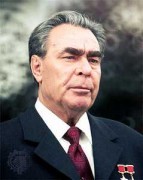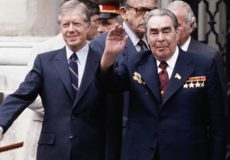Leaders Continue Focus on Heavy Industry the Economy Brezhnev Doctrine
Leonid Brezhnev (1906-1982) was the leader of the Soviet Union from 1964 until his death in 1982.

Brezhnev was born in Kamenskoye in Ukraine, the son of a steelworker and a housewife. Like his father, he was given a technical education in metallurgy and sent to work in steel factories. Brezhnev joined the Komsomol youth party as a teenager and the Communist Party (CPSU) in 1929.
His loyalty to Joseph Stalin opened up opportunities for the young Brezhnev. By 1939, he was the CPSU secretary in his hometown. In 1941 Brezhnev joined the Red Army as a political commissar. He served for the duration of World War II and reached the rank of major general.
Brezhnev's escalation through the ranks of the CPSU continued after the war. He spent the 1950s working as a regional party secretary, and during this period earned membership of the Central Committee (1952) and the Politburo (1957).
Until 1963 Brezhnev was loyal to incumbent Soviet leader Nikita Khrushchev – but like other hardliners he was disappointed with Khrushchev's economic reforms and his handling of the Cuban missile crisis. Brezhnev replaced Khrushchev as Soviet leader in 1964 and was elected general secretary of the CPSU two years later.
As the Soviet leader, Brezhnev revived some aspects of Stalinism, particularly its repression of critics and dissidents. Censorship of the press, literature and the arts was increased; several Soviet writers were arrested and sent to trial; the investigative powers of state security agencies like the KGB were restored.
Even more devastating were Brezhnev's economic policies, which were anti-reformist and pushed the Soviet Union into a decade of stagnation and negative growth. Living standards and the availability of consumer goods, both of which had improved under Khrushchev, suffered under Brezhnev. There were also significant increases in bribery, corruption and alcoholism.

In foreign policy, Brezhnev oversaw a thaw in US-Soviet relations. He held several summits with presidents Richard Nixon, Gerald Ford and Jimmy Carter; negotiated both SALT arms limitation treaties (1972 and 1979); and signed the Helsinki Accords (1975).
Brezhnev visited the United States in 1973 and became the first Soviet leader to directly address the American people on radio and television. He also approved the Treaty of Moscow, a non-aggression pact with West Germany, in 1970. For these reasons, Brezhnev is considered one of the architects ofDétente. He was not so compromising with dissidents inside the Soviet bloc, however.
It was Brezhnev who ordered the invasion of Czechoslovakia and the crushing of the Prague Spring in 1968. He justified this with the 'Brezhnev Doctrine', declaring that the Soviet Union would intervene in other socialist nations, where Moscow perceived that socialism was under threat. In 1979, he again referred to this doctrine when ordering Soviet troops into Afghanistan.
Leonid Brezhnev suffered from poor health in the final years of his rule. In his final year (1981-82) he did not attend most government meetings and was rarely sighted in public. A frail Brezhnev made his final public appearance in November 1982, at a parade marking the 65th anniversary of the October Revolution. He died of a heart attack three days later. Like Stalin, Brezhnev was buried near the Kremlin wall. After his death the leadership passed to former KGB chief Yuri Andropov.
Citation information
Title: "Leonid Brezhnev"
Authors: Jennifer Llewellyn, Steve Thompson
Publisher: Alpha History
URL: https://alphahistory.com/coldwar/leonid-brezhnev/
Date published: October 20, 2018
Date accessed: October 19, 2022
Copyright: The content on this page may not be republished without our express permission. For more information on usage, please refer to our Terms of Use.
byfordcomprignate.blogspot.com
Source: https://alphahistory.com/coldwar/leonid-brezhnev/
Belum ada Komentar untuk "Leaders Continue Focus on Heavy Industry the Economy Brezhnev Doctrine"
Posting Komentar